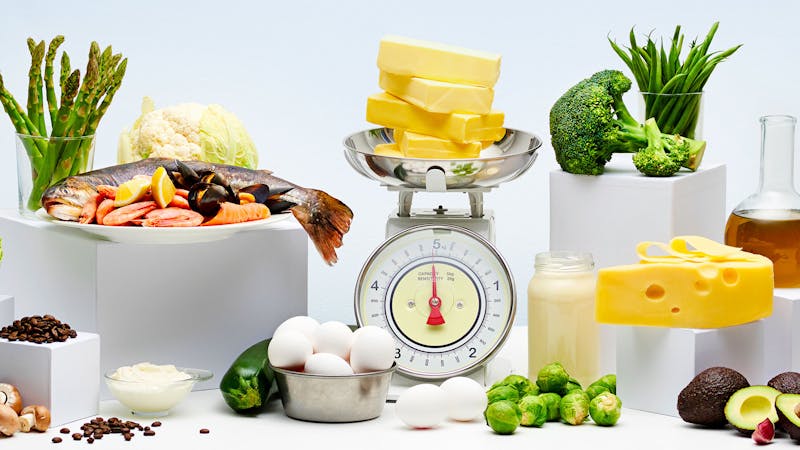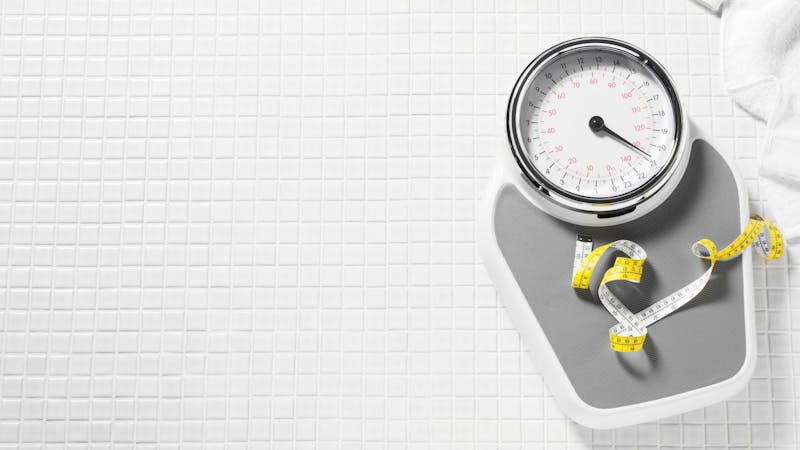Top 10 tips to lose weight on low carb or keto for women 40+

More
Earlier
Earlier with Anne Mullens
Obstetrics & Gynecology Clinics of North America: The timing of the age at which natural menopause occurs [overview article; ungraded] ↩
It’s estimated that most women, without changing anything in their diet or lifestyle, gain an average of 2 to 5 pounds during the menopausal transition. However, some gain much more than this:
Journal of Women’s Health 1998: The influence of sex hormones on obesity across the female life span [overview article; ungraded] ↩
This is based on clinical experience of low carb practitioners and was unanimously agreed upon by our low carb expert panel. You can learn more about our panel here [weak evidence]. ↩
This is mainly based on clinical experience of low carb clinicians [weak evidence] ↩
Protein intake within this range has been shown to preserve muscle mass, improve body composition, and provide other health benefits in people who eat low carb diets:
Peer J 2019: Low carbohydrate diets differing in carbohydrate restriction improve cardiometabolic and anthropometric markers in healthy adults: a randomised clinical trial [moderate evidence]
Diabetes Therapy 2018: Effectiveness and safety of a novel care model for the management of type 2 diabetes at 1 year: an open-label, non-randomized, controlled study [weak evidence] ↩
British Journal of Nutrition 2020: The effect of 12 weeks of euenergetic high-protein diet in regulating appetite and body composition of women with normal-weight obesity: a randomised controlled trial [randomized trial; moderate evidence]
Nutrition Journal 2014: Effects of high-protein vs. high- fat snacks on appetite control, satiety, and eating initiation in healthy women [randomized trial; moderate evidence]
Journal of the American College of Nutrition 2004: The effects of high protein diets on thermogenesis, satiety and weight loss: a critical review [systematic review of randomized trials; strong evidence] ↩
Many experts in the field of protein and aging recommend a protein intake of at least 1.2 g/kg/day for older adults:
Nutrients 2016: Protein consumption and the elderly: What is the optimal level of intake? [overview article; ungraded]
In a 12-week trial of older adults who were frail or at high risk for frailty, participants who increased their protein intake to 1.5 g/kg/day achieved significant increases in muscle mass compared to those who consumed less protein:
The American Journal of Clinical Nutrition 2018: Protein supplementation improves muscle mass and physical performance in undernourished prefrail and frail elderly subjects: a randomized, double-blind, placebo-controlled trial [randomized controlled trial; moderate evidence] ↩
Systematic reviews of randomized controlled trials exploring intermittent fasting have concluded that IF is at least equally effective for losing weight compared to continuous calorie restriction:
Canadian Family Physician 2020: Intermittent fasting and weight loss: Systematic review [strong evidence]
Obesity Reviews 2017: Short‐term intermittent energy restriction interventions for weight management: a systematic review and meta‐analysis [strong evidence]
JBI Database of Systematic Reviews and Implementation Reports 2018: Intermittent fasting interventions for treatment of overweight and obesity in adults: a systematic review and meta-analysis [strong evidence] ↩
This is based on an individual clinician’s experience. [very weak evidence]
↩Journal of Infusion Nursing 2014: Pathophysiology, treatment, and prevention of fluid and electrolyte abnormalities during refeeding syndrome
[overview article; ungraded] ↩This is based on clinical experience of low carb practitioners and was unanimously agreed upon by our low carb expert panel. You can learn more about our panel here [weak evidence]. ↩
Part of the way low carb diets result in improved weight loss may be due to reduced hunger and overall calorie intake.
A 2019 RCT reported reduced cravings with low carb diets
Nutrients 2019: Changes in Food Cravings and Eating Behavior after a Dietary Carbohydrate Restriction Intervention Trial [randomized trial; moderate evidence]
In several studies, limiting net carbs to less than 20 grams per day has been shown to reduce appetite and intake, leading to weight loss without hunger:
The American Journal of Clinical Nutrition 2008: Effects of a high-protein ketogenic diet on hunger, appetite, and weight loss in obese men feeding ad libitum [randomized crossover trial; moderate evidence]
Annals of Internal Medicine 2004: A low carbohydrate, ketogenic diet versus a low fat diet to treat obesity and hyperlipidemia: a randomized, controlled trial [moderate evidence]
Annals of Internal Medicine 2005: Effect of a low carbohydrate diet on appetite, blood glucose levels, and insulin resistance in obese patients with type 2 diabetes [non-randomized trial; weak evidence]
Nutrition & Metabolism 2005: A low carbohydrate, ketogenic diet to treat type 2 diabetes [non-randomized trial; weak evidence] ↩
Drinking alcoholic beverages can slow down weight loss because your body burns alcohol before it burns carbs, protein, and fat — including body fat:
The Journal of Clinical Investigation 1988: Ethanol causes acute inhibition of carbohydrate, fat, and protein oxidation and insulin resistance [randomized trial; moderate evidence] ↩
This is mainly based on clinical experience of low carb clinicians [weak evidence] ↩
This is mainly based on the clinical experience of low carb clinicians [weak evidence]
There’s also a published study showing that avoiding artificially-sweetened drinks helped overweight people lose weight and improve their insulin sensitivity:
The AmericanJournal of Clinical Nutrition 2015: Effects on weight loss in adults of replacing diet beverages with water during a hypoenergetic diet: a randomized, 24-wk clinical trial [randomized trial; moderate evidence] ↩
Research has confirmed this effect for people of all ages, although to a greater extent for men than women:
International Journal of Obesity and Related Metabolic Disorders 1995: Resting metabolic rate and cardiovascular disease risk in resistance- and aerobic-trained middle-aged women [non-randomized study; weak evidence]
Journal of the American Dietetic Association 2001: Effects of habitual physical activity on the resting metabolic rates and body compositions of women aged 35 to 50 years [non-randomized study; weak evidence]
Medicine and science in sports and exercise 2001: Effect of strength training on resting metabolic rate and physical activity: age and gender comparisons [non-controlled study; weak evidence]
Journal of Applied Physiology 1985: Strength training increases resting metabolic rate and norepinephrine levels in healthy 50- to 65-yr-old men [non-controlled study; weak evidence] ↩
In studies, resistance training has been shown to consistently improve insulin sensitivity in adults, including people with diabetes and postmenopausal women. Improving insulin sensitivity may make weight loss easier:
Diabetes Care 2005: Twice-weekly progressive resistance training decreases abdominal fat and improves insulin sensitivity in older men with type 2 diabetes [non-controlled study; weak evidence]
Journal of Strength and Conditioning Research 2012: Insulin sensitivity after maximal and endurance resistance training. [non-controlled study; weak evidence]
The Journals of Gerontology. Series A, Biological Sciences and Medical Sciences 1996: Resistive training increases insulin action in postmenopausal women [non-controlled study; weak evidence] ↩
This is based on Dr. Naiman’s clinical experience.[very weak evidence] ↩
This is based on Dr. Hallberg’s clinical experience.[very weak evidence] ↩
Obstetrics and Gynecology Clinics of North America 2018: Sleep, health, and metabolism in midlife women and menopause: food for thought [overview article; ungraded] ↩
Psychoneuroendocrinology 2017: Habitual sleep quality and diurnal rhythms of salivary cortisol and dehydroepiandrosterone in postmenopausal women [observational study; very weak evidence]
Sleep Science 2015: Interactions between sleep, stress, and metabolism: From physiological to pathological conditions [overview article; ungraded] ↩
Some people eat more in response to stress and higher cortisol levels than others:
Psychoneuroendocrinology 2001: Stress may add bite to appetite in women: a laboratory study of stress-induced cortisol and eating behavior [non-randomized study; weak evidence]
In addition, at least one study suggests that women with a tendency to carry weight around the middle may release more cortisol during stressful situations than smaller-waisted women:
Obesity Research 1994: Stress-induced cortisol response and fat distribution in women [non-randomized study; weak evidence] ↩
Personality and Individual Differences 2014: Stress and emotional eating: The mediating role of eating dysregulation [observational study; very weak evidence] ↩
This is based on consistent clinical experience of low carb practitioners. [weak evidence] ↩


